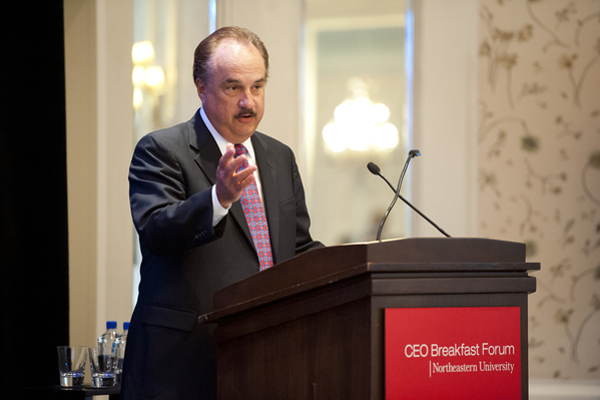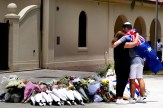Innovation key to improving patient care, access

Larry J. Merlo, president and CEO of CVS Caremark, said on Tuesday morning at Northeastern’s CEO Breakfast Forum that the challenges presented by America’s rapidly evolving healthcare landscape will require innovative solutions that lower costs and improve patient access to quality care.
Merlo said today’s healthcare industry is grappling with challenges ranging from meeting the needs of Baby Boomers to what he called the “epidemic” of patients’ non-adherence to prescription medication schedules. The Affordable Care Act, he added, is constantly introducing new elements into the fold.
“All of the stakeholders in the system including consumers, employers, and hospitals, are experiencing levels of unprecedented change,” said Merlo, the latest keynote speaker at Northeastern’s CEO Breakfast Forum series. President Joseph E. Aoun hosts the events, where leading CEOs share their expertise with audiences of other CEOs and senior executives from the Greater Boston area.

President Joseph E. Aoun, right, greets Larry Merlo, president and CEO of CVS Caremark, on Tuesday morning at Northeastern’s CEO Breakfast Forum. Photo by Brooks Canaday.
CVS Caremark, Merlo explained, is driving many innovative approaches to meet these healthcare challenges, particularly by reinventing pharmacy’s role in the equation. He detailed CVS Caremark’s Pharmacy Advisor Program, which helps patients manage the treatment of chronic diseases through a variety of resources such as counseling services and email notifications. He also pointed to MinuteClinic, CVS Caremark’s retail medical clinics located in select CVS/pharmacy stores nationwide that Merlo said offer convenient, affordable, high-quality care and ease the burden on hospitals treating non-emergency conditions. Launched in 2000, there are now 650 MinuteClinic locations that have collectively treated 15 million patients.
“CVS Caremark is uniquely positioned to help stakeholders navigate the complexities of a changing healthcare system,” said Merlo. He noted that the company’s resources and services are extending the frontlines of care for consumers, helping to alleviate the primary-care physician shortage, closing gaps in care, and improving medication adherence.
In his introductory remarks, Aoun highlighted the longstanding relationship between Northeastern and CVS Caremark, particularly through partnerships in the School of Pharmacy and School of Nursing in the Bouvé College of Health Sciences. CVS Caremark currently employs 278 alumni and nearly 700 students have completed co-ops at CVS Caremark since 2002. In addition, 45 pharmacy students from the 2013 graduating class were placed at CVS Caremark for their Advanced Pharmacy Practice Experiences—intensive experiential courses—during their final year in the Doctor of Pharmacy program.
“Northeastern graduates have certainly demonstrated their leadership abilities among our workforce,” Merlo said.
Aoun noted how Northeastern’s innovative approach to higher education through experiential education parallels CVS Caremark’s novel approach to healthcare solutions. “I was struck by the similarities between the two,” he said.
During a question-and-answer session, Jack Reynolds, dean of the School of Pharmacy, asked Merlo to discuss ways in which the school’s curricula could integrate new elements that align with the evolving healthcare field. Merlo pointed to two areas of opportunity: customer interaction and the evolving nature of the pharmacy industry.
Describing the challenges related to customer interaction, Merlo told the story of a MinuteClinic nurse practitioner who noticed a high-school athlete’s heart murmur during a routine physical and directed the family to a specialist. The boy’s mother initially questioned the finding, but the specialist’s later confirmation compelled her to write a warm letter to CVS Caremark lauding the nurse practitioner’s careful attention.
“This is just one story about what is happening out there every day, whether it’s a nurse practitioner or a pharmacist doing wonderful things that ultimately end up saving people’s lives,” Merlo said.





